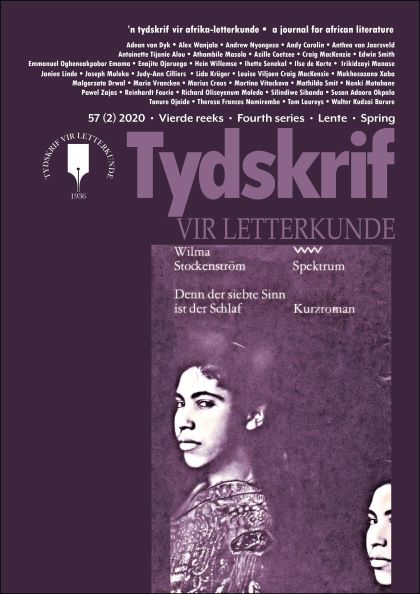Intellectuele toe-eigening en discursief geweld in Focquenbrochs Afrikaense Thalia (1678)
DOI :
https://doi.org/10.17159/tl.v57i2.6513Mots-clés :
Afrikaense Thalia, Afrikaense Brieven, Focquenbroch, early modern travel writing, Elmina Castle, intellectual appropriationRésumé
In 1668, the Dutch medic and poet Willem Godschalck van Focquenbroch left Amsterdam for the African Gold Coast to become “fiscaal” (a kind of public prosecutor) on behalf of the Dutch West India Company (WIC) at Elmina Castle in Guinea, which was a bulwark of the Dutch transatlantic slave trade. In his posthumously published Afrikaense Thalia (African Thalia, 1678), a collection of poems and letters containing the well-known Afrikaense Brieven (African Letters), Focquenbroch testifies to his life and work in Elmina Castle through his alter ego “Focq”. In this article, I use Stephen Greenblatt’s notions of “wonder” and “possession” to demonstrate that Focq’s descriptions in the Afrikaense Brieven can be read as an expression of his initial wonder for, and subsequent appropriation of Guinea and its inhabitants. I argue that Focq’s literary-intellectual appropriation of the African Other, which at first sight seems rather innocent compared to the brutal physical appropriation of African people by the Dutch colonists, can nevertheless be considered violent at a discursive level. Focq’s conviction that he is superior to the Guineans because he possesses written language enables him to frame his writing in a discourse which stresses the superiority of the own culture and the culturelessness of the African Other. As such, Focq degrades and instrumentalizes the African Other in order to glorify and preserve the Self.
Téléchargements
Références
Beekman, E. M. The crippled heart: an introduction to the life, times and works of Willem Godschalck van Focquenbroch. Astraea, 1997.
Binder, F. & N. Schneeloch. “Dirck Dircksz. Wilre en Willem Godschalk van Focquenbroch (?), geschilderd door Pieter de Wit te Elmina in 1669.” Bulletin van het Rijksmuseum vol. 27, no. 1, 1979, pp. 13–29. https://www.jstor.org/stable/40382264.
Bosman, W. Nauwkeurige beschryving van de Guinese Goud- Tand- en Slavekust. Isaak Stokmans, 1703.
Bostoen, K. “Opgewekte berichten uit het droevig Morenland: Afrika en de Afrikanen in de Afrikaense-Brieven (1668–1670) van Focquenbroch.” Fumus vol. 5, 2007, pp. 1–28. http://www.focquenbroch.nl/fumus.
Damen J. C. M. “Dutch Letters from Ghana.” History Today vol. 62, no. 8, 2012, pp. 47–52. https://www.historytoday.com/archive/dutch-letters-ghana.
De Certeau, M. L’écriture de l’histoire. Éditions Gallimard, 1975.
De Ligt, B. “Focquenbroch en Scarron.” Spiegel der Letteren vol. 9, 1966, pp. 161–84. https://www.dbnl.org/tekst/_spi007196501_01/_spi007196501_01_0010.php.
Den Heijer, H. Goud, ivoor en slaven: scheepvaart en handel van de Tweede Westindische Compagnie op Afrika, 1674–1740. Walburg, 1997.
Fanon, F. The Wretched of the Earth. Vertaling Constance Farrington. Penguin, 1990.
Focquenbroch, W. G. van. Willem Godschalk van Focquenbroch. Afrikaense Thalia, gered. door W. Helwig. Sub Rosa, 1986.
Gelderblom, A. J. “Inleiding.” Willem Godschalk van Focquenbroch. De Afrikaanse brieven, gered. door T. Rosenboom & A. J. Gelderblom. Prometheus, 2007, pp. 5–31.
Greenblatt, S. Marvelous Possessions: The Wonder of the New World. Oxford U P, 1991.
Groenenboom-Draai, E. “Met de moed der wanhoop: Focquenbrochs overpeinzingen in een kano.” Fumus vol. 5, 2009, pp. 15–24. http://www.focquenbroch.nl/fumus.
Hamann, C. “Verwundern, Entwundern, Disziplinieren. Hans Meyer bearbeitet den Kilimanjaro.” KulturPoetik vol. 8, no. 1, 2008, pp. 39–59. DOI: https://doi.org/10.13109/kult.2008.8.1.39.
Koopman, F. & F. Wetzels. “Zijn er nog vragen? Een speurtocht in de archieven van de Oude West-Indische Compagnie.” Fumus vol. 15, 2017, pp. 23–31. http://www.focquenbroch.nl/fumus.
Korsten, F-W. A Dutch Republican Baroque: theatricality, dramatization, moment and event. Amsterdam U P, 2017. DOI: https://doi.org/10.1515/9789048532056.
Kuik, C. J. Bloemlezing uit de gedichten en brieven van Willem Godschalk van Focquenbroch. Thieme, 1977.
Lefevere, A. Translation, Rewriting, and the Manipulation of Literary Fame. Routledge, 1992.
Marguc, W. Willem Godschalck van Focquenbroch. Ergänzende Prolegomena. Acco, 1982.
Paijmans, M. “Ook in de zeventiende eeuw werd het debat over kolonialisme gesmoord.” Over de Muur. https://overdemuur.org/ook-in-de-zeventiende-eeuw-werd-het-debat-over-kolonialisme-gesmoord/.
Pieters, J. “‘Be Silent Then, for Danger is in Words’. The Wonders of Reading and the Duties of Criticism.” English Studies vol 82, no. 2, 2001, pp. 106–14. DOI: https://doi.org/10.1076/enst.82.2.106.9599.
Pieters, J. “Gazing at the Borders of The Tempest. Shakespeare, Greenblatt and de Certeau.” Constellation Caliban: Figurations of a Character. Reds. N. Lie & T. D’haen, 1997, pp. 61–79.
Pieters, J. “Tekst, cultuur en geschiedenis: het New Historicism van Stephen Greenblatt in het licht van het (post)structuralistische erfgoed.” Diss. U Gent, 2000. https://lib.ugent.be/nl/catalog/rug01:000519034.
Postma, J. The Dutch in the Atlantic slave trade, 1600–1815. Cambridge U P, 1990.
Pratt, M. L. Imperial Eyes: Travel Writing and Transculturation. Routledge, 1992.
Ramakers, B. “Ter inleiding.” Op de Hollandse Parnas: de Vlaardingse rederijkerswedstrijd van 1616, gered. door B. Ramakers. Waanders, 2006, pp. 7–9.
Said, E. W. Orientalism. Penguin, 1978.
Spivak, G. C. A Critique of Postcolonial Reason: toward a History of the Vanishing Present. Harvard U P, 1999. DOI: https://doi.org/10.2307/j.ctvjsf541.
Thijs, B. De hoefslag van Pegasus: een cultuurhistorisch onderzoek naar Den Nederduytschen Helicon (1610). Verloren, 2004.
Van Engelen, M. Het kasteel van Elmina: in het spoor van de Nederlandse slavenhandel in Afrika. De Bezige Bij, 2013.
Van Stipriaan, R. “De mythe van de miskenning of de grillige roem van Willem Godschalck van Focquenbroch.” Fumus vol. 5, 2007, pp. 29–39. http://www.focquenbroch.nl/fumus.
Van Strien, T. Hollantsche Parnas: Nederlandse gedichten uit de zeventiende eeuw. Amsterdam U P, 1997.
Woordenboek Instituut voor de Nederlandse Taal: https://ivdnt.org/.
Worp, J.A. “Focquenbroch.” De Gids vol. 45, 1881, pp. 499–532. https://www.dbnl.org/tekst/_gid001188101_01/_gid001188101_01_0067.php.
Téléchargements
Publiée
Numéro
Rubrique
Licence
(c) Copyright Tydskrif vir Letterkunde 2020

Ce travail est disponible sous licence Creative Commons Attribution - Partage dans les Mêmes Conditions 4.0 International.


 https://orcid.org/0000-0001-6465-6584
https://orcid.org/0000-0001-6465-6584


.png)